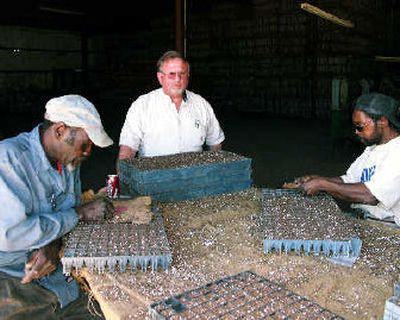Tighter border squeezes farmers

OMEGA, Ga. — Randy Scarbor was counting on the 15 immigrant workers who lived on his farm to harvest his 60-acre sweet-potato crop last fall, but they vanished just as the work got under way. He instead was forced to bring in some less-motivated substitutes for the backbreaking job.
“I wound up hiring some locals that weren’t worth hauling to the field,” he said. “It was the worst harvest labor in my life and I’ve been in the farming business 35 years. But we got it in.”
Scarbor believes most of his regular workers were lured away to the Gulf Coast by the promise of higher wages for jobs associated with hurricane recovery. He said he knows a few also switched to local factory and construction jobs.
He wasn’t the only farmer with labor problems last season. Vidalia onion growers in south Georgia, citrus growers in Florida, fruit growers in Washington and vegetable growers in California’s Imperial Valley also reported a tighter supply of farm workers, and some wonder if that could be a sign of even greater problems this year.
There’s no obvious reason for the farm labor shortages, but several theories are out there, including increased competition with higher paying jobs in most cities and those tied to the cleanup and rebuilding of areas hit by Hurricanes Katrina and Rita.
However, some farm groups also believe increased enforcement along Mexican border also may have curbed the number of illegal immigrants with false documents that get “entry-level” jobs like picking fruits and vegetables. There are also indications anti-immigrant civilian groups such as the Minutemen have discouraged farm workers who could enter the country legally.
Joe Cornelius, president of the 60-member Georgia Blueberry Growers Association, said the farm labor supply seems even tighter this year, but growers will have to wait until harvest in 8 to 10 weeks before they know for sure.
“We are more concerned this year on the way things have played out, the tightening of the border,” said Cornelius, who has a blueberry farm in the southeastern Georgia town of Manor. “Some of the people we deal with are saying they’re having a hard time getting people.”
Farm organizations, such as the American Farm Bureau Federation, have appealed to Congress, which is wrangling over immigration reform this month, to consider the needs of farmers for a workable temporary-worker program that would guarantee a stable supply of legal workers while also protecting the country from criminals and terrorists.
A bill introduced by Sens. John McCain, R-Ariz., and Edward Kennedy, D-Mass., would create a temporary worker program that provides citizenship for those who work hard and demonstrate loyalty to their new country. Sen. Saxby Chambliss, a Georgia Republican who chairs the Senate Agricultural Committee, has proposed streamlining the guest-worker program and require them to return home when their work is finished.
“The American Farm Bureau thinks the United States ought to enforce its laws,” said Paul Schlegel, the farm bureau’s director of public policy. “But we need access to a legal source of labor to harvest our crops.”
The Border Patrol added 1,500 more agents last year and ramped up border surveillance with more checkpoints, high-tech devices such as video-surveillance cameras, seismic detectors and an unmanned surveillance aircraft.
“We have had national growers associations express concerns, but our commitment to protecting this country from terrorists and terrorist weapons is at the forefront of our priorities,” said Border Patrol spokesman Sal Zamora.
Of the nation’s 3 million agricultural workers, about 2 million are members of farm families and 1 million are hired, including an estimated 500,000 who aren’t authorized to work in this country, according to the Farm Bureau.
“The agriculture industry is unique in that we are highly dependent on temporary foreign workers to fill jobs that most Americans do not want to perform,” said Farm Bureau President Bob Stallman. “Many family farms depend on temporary labor and could not sustain the impact of … losses brought about by current immigration proposals.”
The notion of a looming farmworker shortage is not shared by all.
Steven Camarota, research director for the Center for Immigration Studies, a Washington think tank, said farmers could find workers if they were willing to pay competitive wages.
“With the number of labor-intensive acres going up in California, their behavior does not seem to suggest that they see a labor shortage, even if that’s what they tell reporters,” he said. “Farmers always think there’s not enough labor. It’s a very unpredictable business. You can’t control the weather. The one thing you can push for is a lax immigration program, or a guest-worker program.”
But Ayron Schoneman, executive director of California’s Imperial Valley Vegetable Growers Association, said the labor shortage is very real for farmers in the valley, a desert region north of the Mexican border with 450,000 acres of irrigated farmland. The Imperial Valley supplies 90 percent of the nation’s winter vegetables, such as lettuce, spinach and broccoli.